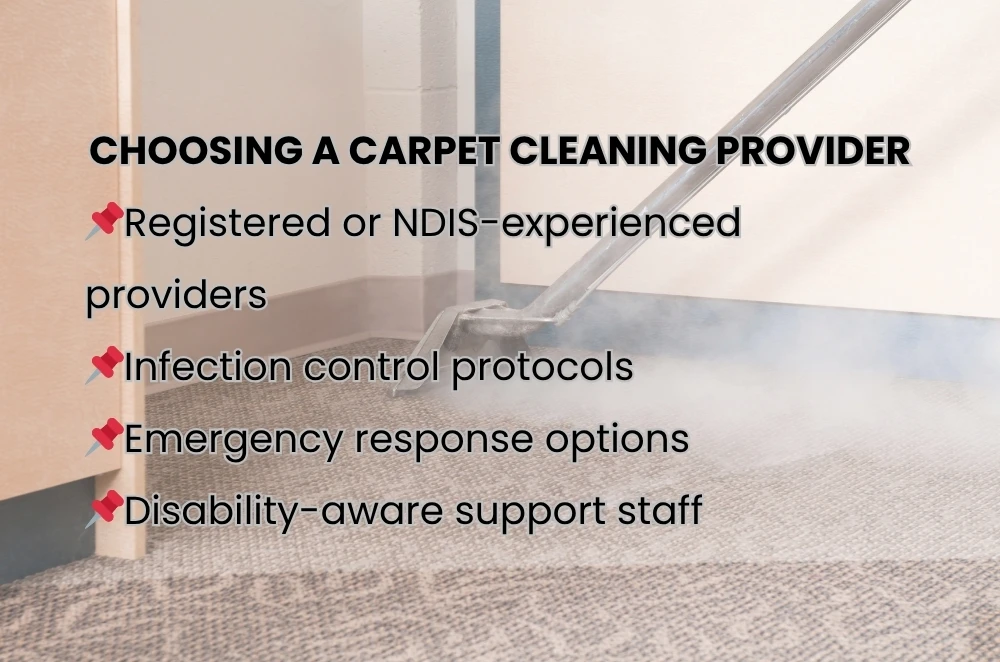Carpet cleaning probably doesn’t top the list when you think of life-changing supports. But for NDIS participants—especially those living with mobility limits, chronic illness, or reduced immunity—a clean floor can mean the difference between comfort and distress.
When my brother—he’s an NDIS participant with cerebral palsy—moved into supported accommodation, we noticed something right off the bat. The carpet looked clean, sure, but the dust? Thick. He started coughing more and sleeping less. The support workers were doing their best, but it wasn’t cutting it. That’s when we looked for a steam cleaner carpet service to get immediate help. The difference? Night and day.
Why clean carpets matter for NDIS participants
Carpets do more than soften your step—they trap allergens, dust mites, pet dander, and bacteria. For someone with sensitivities or compromised health, these particles can contribute to ongoing issues such as:
- Aggravated asthma and respiratory distress
- Skin irritation or infection
- Worsened allergies
- Difficulty maintaining hygiene standards
That’s where carpet cleaning health benefits become more than a matter of cleanliness—they’re part of a participant’s health management plan.
Professional carpet cleaning uses hot water extraction or low-moisture encapsulation methods that remove contaminants deep within fibres. It’s not the kind of job a quick vacuum can handle.
The link between NDIS funding and cleaning support
Under the NDIS, participants may be eligible for cleaning services if they are directly related to their disability. This includes both regular maintenance and urgent cleaning after incidents like incontinence, spills, or illness.
Yet, accessing these services can be confusing. Many participants or their carers aren’t aware that carpet cleaning falls under “Assistance with Daily Living” or “Home Cleaning” support categories.
In our case, it took a Local Area Coordinator (LAC) to clarify that an urgent clean could be included when linked to health needs and participant safety. If your plan includes core supports or has been adjusted under “Improved Daily Living,” you may be entitled to cleaning sessions, whether regularly scheduled or one-off emergencies.
And if your plan is self-managed or plan-managed, you have more flexibility in choosing providers who specialise in cleaning for NDIS participants.
What to look for in a professional carpet cleaning provider

Not every cleaning business is equipped for NDIS. Here’s what to look for:
- Registered or NDIS-experienced providers: Even unregistered providers can be used by plan-managed or self-managed participants, but NDIS knowledge is key.
- Infection control protocols: Look for services that utilise hospital-grade products, personal protective equipment (PPE), and adhere to industry hygiene standards.
- Emergency response options: Sometimes cleaning can’t wait for business hours—check for same-day or 24-hour availability.
- Disability-aware support staff: Communication, empathy, and respect are essential when working in supported housing or private homes.
Some providers, like those offering carpet cleaning, specialise in responsive services for spills, bodily fluids, or end-of-lease transitions, crucial when care standards must be upheld.
When urgent means urgent
Let me share a moment that changed how we viewed cleaning services.
Last year, my mum called in a panic. My brother had just had a seizure, during which he vomited on the carpeted lounge. Support workers cleaned what they could, but the odour lingered. We were hosting an NDIS plan review the following week.
We called a service that offered carpet cleaning. They arrived within hours. Not only did they sanitise the entire area, but they documented the service in a way that we could attach to our plan notes, justifying both the urgency and the expense.
It wasn’t just about aesthetics. That quick response prevented infection risk, preserved the furniture, and allowed the review to go ahead in a clean, respectful space.
Boosting independence through better home environments
Clean homes support independent living, especially when participants are transitioning out of full-time care or living semi-independently. NDIS goals often include increased autonomy, and that means being able to live in a space that’s safe, hygienic, and welcoming.
Here’s what participants gain from routine carpet cleaning:
- Confidence in hosting visitors, family, or allied health professionals
- Better air quality, which contributes to fewer health setbacks
- Reduced stress for carers and support workers
- Preservation of SDA (Specialist Disability Accommodation) condition reports
Many participants also use cleaning services to support their social goals. A clean home makes it easier to engage with the community, attend therapy, or invite peers into shared living spaces.
When discussing how NDIS supports home hygiene, it becomes clear that these services don’t just tick a box—they’re central to achieving long-term health and wellbeing outcomes.
Tips for including carpet cleaning in your NDIS plan
Navigating plan reviews can be tricky, but here are a few tips to include or justify carpet cleaning in your budget:
- Use incident records or photos to show why urgent cleaning was required
- Gather evidence from allied health professionals, such as OTs or support coordinators
- Link cleaning to goals, e.g. “maintaining a safe and healthy home environment”
- Request service invoices with clear descriptions (e.g. “sanitised carpet following incontinence event”)
If unsure, chat with your Support Coordinator or LAC. And remember: even self-managed plans have access to cleaning, so long as the expense is reasonable and disability-related.
Final thoughts
Not every hero wears a cape. Some wear boot covers, carry a carpet extractor, and arrive within two hours of your call.
For NDIS participants, professional carpet cleaning isn’t a luxury. It’s part of living well. It helps prevent health risks. It reduces stress for carers. It supports goals around independence, dignity, and comfort.
It may seem small, but it’s one of those quiet supports that make a big difference.

